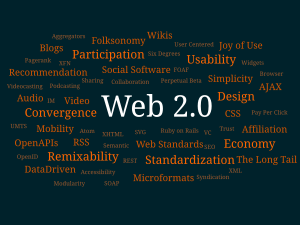Internet Has Several Services
-Â Â Â Â Â Â Â Â Â WWW (World Wide Web)
-Â Â Â Â Â Â Â Â Â Email
-Â Â Â Â Â Â Â Â Â Chat
-Â Â Â Â Â Â Â Â Â Online Payment
-Â Â Â Â Â Â Â Â Â FTP (File Transfer Protocol)
-Â Â Â Â Â Â Â Â Â Voice over Internet Protocol (VoIP) and IPTV.
-         Instant messaging and More…..
Among them WWW was the famous and mostly used service, so people thought that WWW as “The Internetâ€.
Before you learn about Web 2.0, you should know little about Web 1.0.

Web 1.0
It is a service which provides Collection Static Pages (Still pages which never changes its content) with stranded Hyper links (used to link the pages). It used HTML (HyperText Markup Language) to display the web pages such as Text, Images, Videos &…..
So when we had Web 1.0 we used the services separately
Eg : We used – Britannica Online to search about Countries & ……., and Chat with our friends   with Yahoo Massager , and E-mail a letter using Yahoo Mail.
But Web 2.0 Has Changed our lives.
Web 2.0 – (Known as Internet 2)
I would say it as “The Integrated Web of Internet†– because Web 2.0 has interconnected web services to each other
The Main Technology / Part of Web 2.0 (Web 2.0 is built based on)
- RIA – Rich Internet Application (Flash, Ajax)
- SOA – Service Oriented Architecture
- Social Web
RIA : It is based on “How to bring the user experience of the desktop in to the Web browser†(How give the desktop feel to the browser)
Eg: Drag & Drop, Shortcut Keys, Graphics…….
SOA : It’s about “How do Web Applications Integrate With Other Applicationsâ€
Eg : Feeds (RSS), MashUps (Integrated Web Services), Youtube to facebook to twitter
Social Web : This Mostly Interact with the end user
Eg : Social Networking, Blogging, Wikis
“The term Web 2.0 is associated with web applications that facilitate participatory
- Information sharing
- Interoperability
- User-centered design
- Collaboration on the World Wide Web.
A Web 2.0 site allows users to interact and collaborate with each other in a social media dialogue as creators (prosumers) of user-generated content in a virtual community, in contrast to websites where users (consumers) are limited to the passive viewing of content that was created for them. Examples of Web 2.0 include social networking sites, blogs, wikis, video sharing sites, hosted services, web applications, mashups and folksonomies.†– Says Wikipedia.

Web 2.0 Involves Making NEW and IMPROVED forms of Online Connections.
- Between Two or more People
- Between Two or more Online Services
- Between Two or More People and Software’s
The Key Aspect of Web 2.0 (Two point O)
- Interpersonal Computing
- Web services
- Software as a Service
Interpersonal Computing :
- Social Networking – facebook, MySpace, Orkut
- Wikis – Wikipedia
- Blogging – Blogger, WordPress, Xanga, Thoughts, Thumbler
- Online Video, Audio & Photo Sharing – YouTube, Muziboo, Flicker
Web services
- Payment Services – PayPal, AlertPay
- Maps & Latitude – Google Map, Microsoft Virtual Earth
- Online Video, Audio & Photo Hosting – YouTube, Muziboo, Flicker
Software as a Service
- Online Office Application – Google docs, ZoHo, Microsoft Office Web
- Web OS – eyeOS, MyGoya, iCloud
- Online Sharing & Hosting – Jooce, Media Fire
- Online Video, Audio & Photo – YouTube Remixer, Jaycut, Pixlr
| Web 1.0 | Web 2.0 | |
| DoubleClick | –> | Google AdSense |
| Ofoto | –> | Flickr |
| Akamai | –> | BitTorrent |
| mp3.com | –> | Napster |
| Britannica Online | –> | Wikipedia |
| personal websites | –> | blogging |
| evite | –> | upcoming.org and EVDB |
| domain name speculation | –> | search engine optimization |
| page views | –> | cost per click |
| screen scraping | –> | web services |
| publishing | –> | participation |
| content management systems | –> | wikis |
| directories (taxonomy) | –> | tagging (“folksonomy”) |
| stickiness | –> | syndication |


1 Comment
Hey there! This is my first visit to your blog! We are a collection of volunteers and starting a new initiative in a community in the same niche. Your blog provided us useful information to work on. You have done a wonderful job!